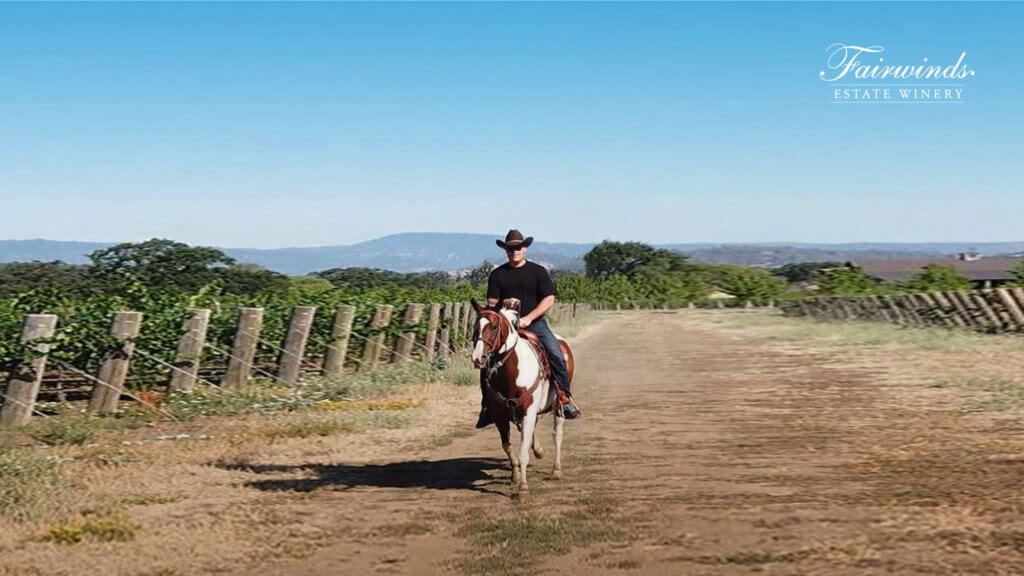Getting to Know Fairwinds Estate Winery’s Brandon Chaney

It has been a trying three months for Fairwinds Estate Winery co-owner and CEO Brandon Chaney. In late September, his Napa Valley winery was heavily damaged by the California wildfires. But Chaney, who purchased the venerable winery in 2015 with his college roommate, has handled this challenge in the same way he seems to handle all of them: with confidence, intelligence, and positivity.
We recently caught up with Brandon, in hopes of learning more about him, getting an update on Fairwinds Estate, and finding out more about his plans for the future. Here’s an edited version of our conversation.
Question: Tell us a little bit about where you are from and how it shaped who you are today.
Answer: I’m from West Lafayette, Indiana. My dad was a professor at Purdue University, so I grew up in a college town. Being a professor, every seven years or so you can go on a sabbatical. My dad decided to take the family to Europe. We lived in England and Wales for a period of time and I discovered wine at a young age. I wasn’t drinking it, but I was fascinated by it. My parents visited wineries and took me in tow. I actually started collecting wine as an 8-year-old. I liked the idea of having it and letting it age over time.
Out of college, I worked for General Electric and then started my own company with my college roommate, the same guy I own the winery with. We were in the high-tech business. Having some success in that business allowed me to fulfill my dream of owning a winery later in life.
Q: I read that your mom was an artist. Can you tell us more about that?
A: My mom ran the overseas study program at Purdue and also taught art at the school. My mom and dad have both influenced me but in different ways. My mom has the creativity and more of the sales side, and my dad was a forestry professor and has tremendous knowledge of his field.
In the wine industry, I have used a lot of the talents that my mom, as a sculptor and painter, shared with me. Wine is technical, like the field of forestry, but there’s an art form to it as well. I’m the product of both of my parents and, throughout my career, I’ve used what they are both really good at. It has been helpful to me in growing my career.
Q: You, among other things, own and run Fairwinds Estate Winery. Tell us more about what inspired you to get involved in the wine industry. How did that come about?
A: I have always loved wine and learning about it. It kind of has this mystique. I’ve just always been fascinated with it from a young age. When I got to the point in my career where I could pivot and look at something outside of the high-tech industry, it was a natural fit.
I don’t feel like I get up in the morning and go to work. I’m doing something that I love and am very passionate about. It’s terrific.
Q: What’s your favorite wine that Fairwinds Estate produces and why is it your favorite?
A: I tend to like bigger wines. Obviously, Cabernet, which Napa Valley is known for. But I think my favorite wine is one that comes from the Bordeaux varietals, so it’s like a Cabernet, but it’s a lesser-known varietal. Fairwinds produces one of the only Carmenères in Napa Valley. It’s the grandfather of Cabernet in some ways. You find a lot of it in South America.
We have the only Parker-rated Carmenère in Napa. It’s a beautiful wine. It’s unique and it’s something we’re known for, so I think that’s probably my favorite.
Q: We know that Fairwinds was greatly affected by the wildfires in California. Can you tell us what happened and how it has impacted the winery?
A: It’s been a crazy last three or four years. There have been fires in California every year—Napa Valley in 2017, Sonoma County in 2018, and more in 2019. This year, when we heard the Glass Fire was raging a couple of miles away, we thought, We will get through this one as well. It won’t hit our winery.
I was getting updates throughout the day and they were like, “It’s getting pretty close.” That night, I couldn’t sleep, and we started getting alarms from our security system. There were probably 20 alarms for broken windows, so we knew the fire had come down and hit the winery. Unfortunately, most of the buildings on the property were destroyed. Luckily, we do have a pretty large wine cave, about 25,000 square feet, and fifty feet underground, and the thousands and thousands of barrels of wine that we’d produced and cultivated and taken care of all survived.
It’s a very emotional thing to go through a fire like that and be impacted by it, but the team has rallied around the prospects of rebuilding, and we are still producing wine. Obviously, it was a setback, but we are going to rebuild better than we were before.
Q: Can you talk about how OSI has helped your winery get through this difficult time?
A: OSI (www.osinearshore.com) has been terrific, a very important part of the winery. You wouldn’t think a nearshore company could help a winery in Napa Valley, but what we love about OSI is their team members who work for us aren’t outta sight outta mind. They’re part of our culture and core winery team when it comes to accounting, sales support, and helping develop marketing materials.
When the fire happened, having OSI offsite was actually very helpful. We were able to continue all the functions they help us with without any impact whatsoever.
From the very beginning, OSI has been a big part of the winery, helping us in many ways, and they continue to do so.
Q: What are your plans for the winery moving forward, not just dealing with the aftermath of the fire, but with COVID-19 as well? What do you all hope to accomplish? How are you planning to adapt?
A: I think COVID has been a watershed moment for the wine industry, in the sense that people were used to going to the grocery store for wine or they purchased it in a restaurant. I think people are establishing new ways to connect with different alcohol brands and figure out how to purchase them and enjoy them at home.
We have actually been able to sell more wine this year than any other year in our history, mainly because we’re selling them direct to consumers. We were dependent on people coming to the winery. Our wines are limited production and handcrafted. We don’t mass-produce them to sell in grocery stores. Going forward, because we’ve learned how to communicate with our customers through social media and direct marketing, we plan to expand that direct-to-consumer channel and focus on it.
Q: What have you learned about OSI being a client?
A: OSI was founded 10 years ago along with one of our start-up companies. We found tremendous talent in Central America that could help the start-up as it grew. Over the last 10 years, we’ve helped our start-up and other start-ups and established companies augment their workforce for capital efficiencies and to be able to bring on board different types of talent. I don’t think I would start a company today and not utilize some form of nearshore outsourcing. When you’re starting a company, capital is very limited, so it’s better to build a good foundation, where you have a nice balance of in-country and out-of-country employees, versus trying to retrofit your company after you have built it.
It’s a luxury for me, as an entrepreneur, to have OSI as a partner and be able to tap into it. That allows me to utilize its resources and be able to grow my companies more efficiently.
Q: You’ve started outsourcing companies and wineries, among your other business ventures. What’s next for you? What direction do you see yourself going in?
A: I’m having so much fun in the wine industry. I plan to focus on wine, on creating amazing wines and selling them directly to folks in the United States and around the world. I also want to rebuild the winery, so we have an amazing place for people who love our wine to come and enjoy it and share it with a friend. That’s what my passion is. I don’t see myself doing anything else.

